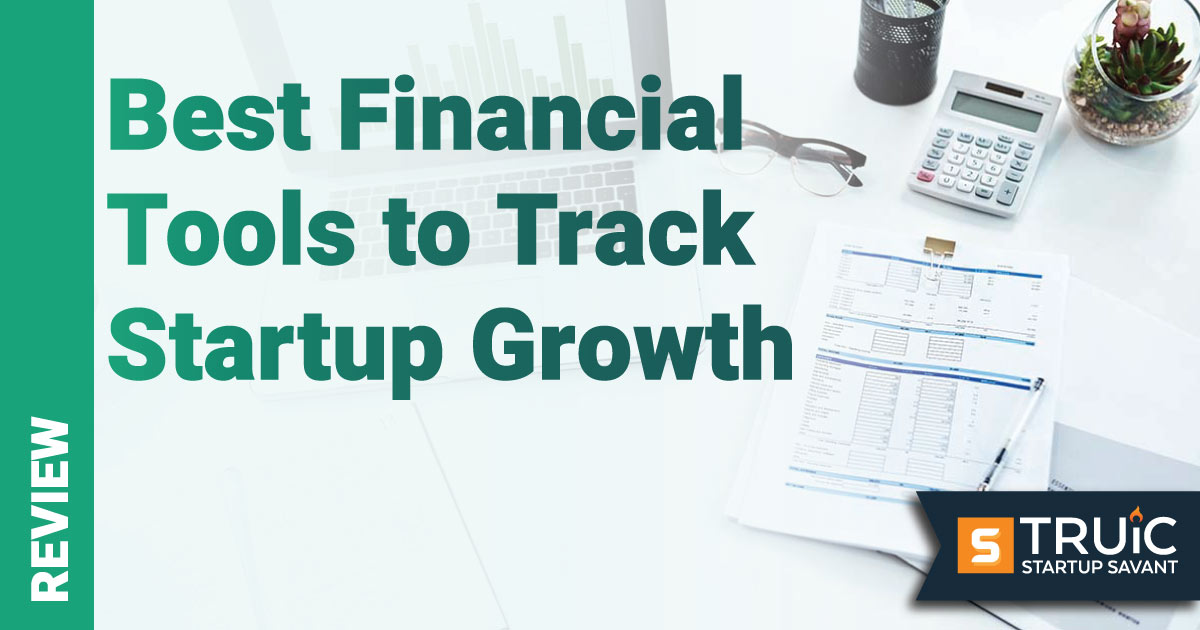Best Financial Tools to Track Startup Growth

Last Updated: By TRUiC Team
As a startup entrepreneur, you know that tracking your growth is essential to success. But with so many different financial tools out there, it can be hard to decide which one is right for you. In this blog post, we will discuss the top financial tools for tracking startup growth and their pros and cons. We will also provide examples of notable features of each tool and explain which type of entrepreneur each tool would be best suited for.
Best Financial Software for Startups
Implementing a financial tool in your startup will help you stay up to date with your progress and give you more data to make informed decisions. Here are the best financial management tools for startups.
What Types of Financial Tools Do Startups Need?
There are a ton of different financial tools available these days, so picking the one for you will depend entirely on what your business needs.
Payroll tools, budgeting, tax preparation, and accounting are just a few of the types of tools a startup can use.
1. Gusto (Payroll)
Gusto is a comprehensive HR platform highly rated for its payroll, benefits, and more. It offers a user-friendly platform that empowers businesses and helps manage teams effectively. It's favored by over 300,000 businesses globally, reflecting its reliability and effectiveness in managing diverse HR functions.
Overall, with Gusto, startups can expect streamlined operations, allowing them to focus more on growth and less on administrative tasks.
Notable Features
- Full-service payroll with unlimited runs and automatic tax calculations
- Employee benefits management including medical, dental, life, and vision insurance
- Time and attendance tracking synced with payroll
- Comprehensive hiring and onboarding tools
Pros
- Easy to use with a direct, streamlined interface
- Comprehensive service covering various aspects of HR and payroll
- Offers tax credit identification and compliance support
Cons
- Some features might require upgrading to higher-tier plans
Best For:
- Startups seeking a dependable payroll software
- Startups looking for a variety of features
Recommended: Get started with Gusto today!
2. QuickBooks (Accounting)
QuickBooks has been around since the early 1990s and is one of the most popular accounting softwares in the market. It covers all areas of accounting from invoicing to creating balance sheets and profit/loss statements.
QuickBooks is also tied to several other well-known financial tools like TurboTax and Mint, which are all under the Intuit umbrella. You could have a fully functioning financial system sticking with just these tools alone.
Notable Features
- Is able to scale with your business as it grows
- Includes a wide variety of reports, such as job costing, cash flow analysis, and aged receivables
Pros
- Widely used so there is a lot of support and information available online
- Very comprehensive software that covers all areas of accounting
Cons
- Can be overwhelming for users who are not familiar with accounting terminology
- Some features are only available in more expensive versions of the software
Best For:
- Startups that want an all-in-one solution for their accounting issues
- Startups that need a system that can scale with their growth
Recommended: Hiring an accountant can save your company thousands of dollars in taxes each year. Get a free tax consultation with 1-800Accountant.
3. Mint (Expense Tracking)
Mint is another Intuit-branded financial tool that is best known for its expense tracking capabilities. You can automate expenses into different categories and receive notifications when bills are due.
Mint is a great tool to help you keep track of where your money is going and can be very helpful in creating and sticking to a budget. It also has the ability to connect with your bank account so you can see all of your transactions in one place.
Notable Features
- Connects with over 17,000 financial institutions
- Can track all expenses and bills in one place
- Notifies you when bills are due
Pros
- Very helpful for following your budget
- Allows you to focus on other areas of business with automatic notifications
Cons
- There are often issues with account synchronization
- You can't actually pay bills using the software
Best For:
- Startups having trouble following the goals of their budget
- Startups who miss payment due dates
4. YNAB (Budgeting)
You Need A Budget, or YNAB, is a budgeting tool that has separated itself by implementing the zero-based budgeting technique into its app. Rather than sticking with restrictive categories for your budget, YNAB relies on four main rules to keep your budget healthy.
Give every dollar a job, embrace your true expenses, roll with the punches, and age your money are all the rules you need to follow to gain control over your startup budget again. If you're having trouble finding enough time to focus on your budget and run your business, you should try out YNAB.
Notable Features
- Syncs with multiple devices for full access
- Customizable categories as well as flexible data reporting
Pros
- Very easy to use and understand for people who are not familiar with budgeting terms
- Provides resources in which you can learn how to manage your business's money better
Cons
- Does not offer bill tracking or bill payment features
- Doesn't sum up your overall financial health very well.
Best For:
- Startups that want easy-to-understand budgeting software
- Starts looking to learn more about how they can take control of their budget
5. TurboTax (Tax Prep)
Another key tool in the financial brand Intuit, TurboTax is the most popular software for preparing and filing your taxes. TurboTax is very user-friendly and can help you maximize deductions, get your biggest refund, and feel confident your taxes are done right.
While TurboTax is best known for being a do-it-yourself tax software, they also have an in-person option where you can have a tax professional help you file your taxes.
Notable Features
- Provides step-by-step guidance to filing your taxes
- Can import W2 and investment information
- Offers audit support and representation
Pros
- Very user friendly with easy-to-follow steps
- Option to have a tax professional do it for you
Cons
- Can be expensive if you need to file a complex return
- Does not offer bookkeeping or accounting features
Best For:
- Startups that need an easy-to-use tax software
- Startups looking for in-person support to prepare for tax season
6. Zoho Inventory (Inventory Management)
Zoho started as a CRM software and has since branched out into a variety of different tools, one of which is inventory management. Zoho Inventory lets you manage your stock, track sales and payments, and forecast future needs.
Zoho Inventory offers great value for small businesses with its low-cost plans and easy-to-use interface. The software can be accessed on any device with an internet connection, making it easy to keep track of your inventory on the go.
Notable Features
- Tracks sales and payments on multiple devices
- Forecasts future needs for guidance support
Pros
- Very affordable plans for small businesses
- Ease of use – the platform can be operated by anyone with basic computer skills
Cons
- Third-party integrations may be glitchy
Best For:
- Startups who are looking for complete access to inventory no matter where they are
- Startups struggling to find an easy way to keep track of product


